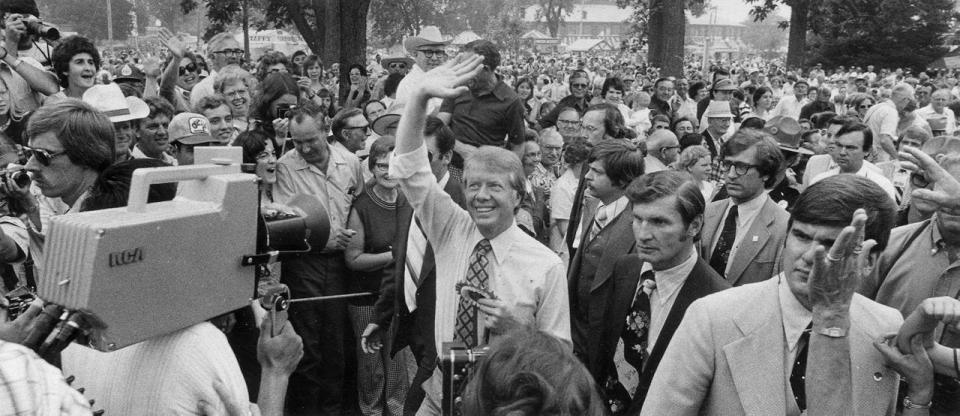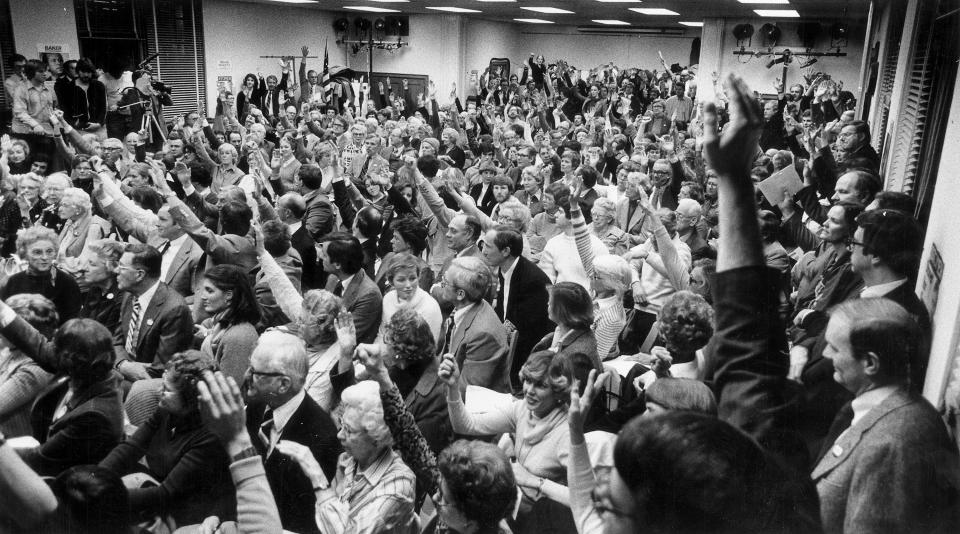Iowa History Month: Iowa’s first-in-the-nation status was challenged in its earliest days
- Oops!Something went wrong.Please try again later.
As all indications are that Iowa will lose its first-in-the-nation role in the Democratic Party’s primary process, it is worth looking at the uneven early history of this political event.
It is well-documented that Iowa’s first-in-the-nation caucuses began with the Iowa Democratic Party in 1972. However, while Jimmy Carter’s success in campaigning in Iowa in 1975 and 1976 initiated his successful presidential bid, Carter supported a revision of the 1980 nomination process in 1977. Additionally, it is often overlooked that Iowa Republicans with an incumbent president in Richard Nixon ignored participating in the 1972 early caucuses, and barely participated in 1976.
Carter’s 1976 campaign presaged the campaigns of succeeding candidates, if not in numbers then with a respectable geographic reach. His first Iowa campaign visit was in Le Mars on Wednesday, Feb. 26, 1975. The Plymouth County Democratic Party was honoring the retiring county recorder Marie Jahn for her 38 years of service. At the event at Westmar College, the Le Mars Daily Sentinel reported that Carter spoke on farm policy, energy issues and the federal government for about 40 minutes. The newspaper described his speech as “captivating,” as Carter called for “economy and efficiency in government.” Reflecting the informality of the process at the time, newspaper reporter Linda Kettner shuttled Carter to the Daily Sentinel’s office following the event for Ms. Jahn.

Other Democratic candidates visited the state, too. The Democratic field included Birch Bayh of Indiana; Fred Harris of Oklahoma; Morris Udall of Arizona; Sargent Shriver of Maryland; and Henry “Scoop” Jackson of Washington. According to an Associated Press report in the Mason City Globe-Gazette of Jan. 20, 1976, Carter visited Iowa 17 days; Bayh 15 days; and Shriver 13 days. Harris was said to be in Iowa about the same number of days as Carter. Carter finished second behind “uncommitted” in the caucus held on Jan. 19 with 27.6% of the state delegate equivalents. Carter won New Hampshire on Feb. 24 and continued to do well, thus earning him the party’s nomination for president.
While Iowa Republicans joined the first-in-the-nation fray in 1976, their effort was incomplete. With Gerald Ford moving into the vice presidency and presidency through resignations, he had a significant challenge from former California Governor Ronald Reagan. The reported results from Iowa Republicans were inconclusive.
The Iowa Republican Party chose to survey only a selection of precincts in the campaign. President Ford won 264 precincts and Ronald Reagan won 248, where results were tabulated in 583 of about 2,536 total precincts. Reagan’s national challenge was substantial with President Ford narrowly gaining the nomination in the Republican National Convention in Kansas City in August 1976. Reagan’s strong national showing made him a frontrunner for Republicans in 1980.
In spite of the relatively smooth operation of the 1976 caucuses and Carter’s solid performance, Carter and his supporters sought to change the nomination process by late 1977. The National Democratic Party’s Commission on Presidential Primaries and Delegate Selection issued a proposal with three features. The commission suggested a primary season from March to June, sought to prevent delegates from switching candidates on the first two ballots at the national convention, and would require a candidate to get at least 25% of the vote in a precinct to gain a state delegate in state nomination contests.
The last provision was a direct attack on Iowa Democrats' 15% threshold for viability in a precinct. The shortened nomination period would also eliminate Iowa’s first-in-the-nation role. It was believed President Carter and his supporters desired to consolidate power and eliminate any threat of competition for the 1980 nomination.

Surprisingly, Iowa Democrats were ambivalent. According to a Dec. 4, 1977 story in the Register, former Iowa Democratic Party Chair Clark Rasmussen saw “nothing wrong with limiting the primary season to 13 weeks.” Robert Fulton, a former lieutenant governor and transitional governor in early 1969, was the only Iowan on the National Democratic Committee. He argued the 1976 process worked well for the party, and “if it works, don’t fix it.” The commission’s report proved largely unpopular due to the restrictions being undemocratic. News it would be scrapped appeared by the spring of 1978, and the report was shelved.
Iowa would retain its first-in-the-nation status for decades, but it is worth recognizing that Jimmy Carter, as the candidate who is often cited as the model for Iowa’s role in the nomination process, led an attack against it less than a year after his inauguration. That President Barack Obama has praised and thanked Iowa for helping launch his 2008 campaign but has not advocated for Iowa is equally telling.
Iowa Republicans also had little concern for the first-in-the nation status in the 1970s. The party did not engage in a first-in-the nation effort until four years after the Iowa Democrats, and the 1976 Iowa Republican caucuses were not fully reported. It's hard to argue the Iowa caucuses were important to the GOP in the early years. When defending our state’s role in the national presidential process, it's important to realize that some Iowans and the political parties showed an early disregard for Iowa’s role as the first-in-the-nation caucus state.
Leo Landis is the state curator for the State Historical Society of Iowa, which provided this essay as part of a series for Iowa History Month. For more information, visit iowaculture.gov.
March is Iowa History Month
To celebrate Iowa History Month, the Register has published weekly essays from leading state historians.
This article originally appeared on Des Moines Register: Iowa History Month: First-in-the-nation status was challenged early on

